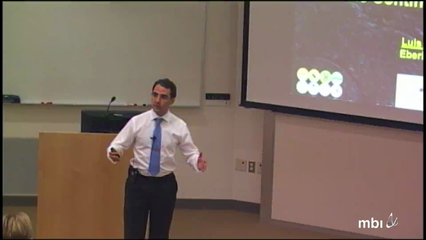MBI Videos
Luis Fonseca
-
 Luis Fonseca
Luis FonsecaThe blood stage of a malaria infection is the final step of the dual-host multi-stage disease. It is at this stage that most symptoms manifest and where the outcome is critical for the future disease trajectory toward either chronic infection or death. The blood stage is marked by the interplay between malarial merozoites, the erythropoietic system, and the immune system. Failure to properly up-regulate erythropoiesis results in anemia, while an improper immune response may lead to chronic infection that is characterized by recrudescence or relapse.
The production of red blood cells (RBCs) by the erythropoietic system takes about 5 days in our model organism, Macaca mulatta, and the RBCs normally remain in the blood stream for about 100 days. During this life cycle, only RBCs of the early age-classes are prone to merozoite invasion. Upon invasion, growth of the tropozoites into schizonts and the subsequent release of about 14 to 20 new merozoites take about 48 hours for the infecting parasite, Plasmodium cynomolgi. A computational systems analysis of the processes involved in the dynamics of RBCs in malaria demonstrated that the blood stage events are strongly dependent on different time delays and the structure of age-classes among the RBCs.
In this workshop presentation, we will discuss the advantages and disadvantages of using: ordinary differential equation (ODE) models with and without age-classes; delay differential equations (DDE); or discrete recursive models with age-classes. DDEs and ODEs with age-classes are well suited for the generation of delays, but lack the required flexibility to properly address issues associated with the constantly changing differentiation time of RBC precursors. By contrast, discrete recursive models allow the proper movement of all cells through their life cycle, while also allowing variables to be associated with dynamically changing delays, amplification ratios, and different types of injuries or infections, including malaria.
